Discover Politics Politics Politics
Politics Politics Politics

Politics Politics Politics
Author: Justin Robert Young
Subscribed: 2,044Played: 82,625Subscribe
Share
© Justin Robert Young
Description
Unbiased political analysis the way you wish still existed. Justin Robert Young isn't here to tell you what to think, he's here to tell you who is going to win and why.
www.politicspoliticspolitics.com
www.politicspoliticspolitics.com
467 Episodes
Reverse
The Epstein files keep coming out, and instead of clarity, they are producing something far messier: suspicion without resolution and outrage without proof.What we are seeing now is not the mythical document many people imagine, a clean list pairing powerful men with specific criminal acts. That list does not exist. What exists are FBI files and grand jury materials filled with allegations, some credible, some vague, many never fully investigated. The result is a widening cloud of suspicion over a long list of names, with no clear answers about who did what or why prosecutors failed to act when they had the chance.Politics Politics Politics is a reader-supported publication. To receive new posts and support my work, consider becoming a free or paid subscriber.That ambiguity is why this release satisfies no one. New documents, like the bizarre and possibly fake letter to Larry Nassar attributed to Epstein after his death, only deepen confusion rather than resolve it. If the Trump administration delayed releasing these files out of fear of what they contained, that decision backfired badly. The slow drip has turned the Epstein case into a permanent Rorschach test, where everyone sees what they already believe. Until the Justice Department explains what it has, what it does not, and why accountability failed for so long, the Epstein story will remain unresolved and corrosive.Chapters00:00 - Intro01:39 - Epstein05:16 - Tevi Troy on Lame Duck Presidents49:41 - Wrap-up This is a public episode. If you'd like to discuss this with other subscribers or get access to bonus episodes, visit www.politicspoliticspolitics.com/subscribe
Donald Trump’s primetime address this week was far less dramatic than advertised, but far more revealing than it looked at first glance. Stripped of the rumors and speculation, the speech functioned as a quiet reset on the issue that matters most to his presidency: the economy.Going into the address, expectations were wildly inflated. Cable chatter and online speculation had convinced many people that Trump was preparing to announce military action in Venezuela or unveil a sweeping foreign policy shift. Instead, the speech clocked in at just under 20 minutes and stayed tightly focused on affordability, inflation, and household pressure. That choice alone tells you where the White House believes its real vulnerability lies.Politics Politics Politics is a reader-supported publication. To receive new posts and support my work, consider becoming a free or paid subscriber.Trump did something slightly out of character by acknowledging economic strain without declaring immediate victory. He framed the economy as a process rather than a finished product, arguing that recovery takes time and patience. That is a notable shift from his usual insistence that conditions are already excellent. It was not an apology, but it was an admission that voters are not wrong to feel squeezed.Much of the address revolved around tariffs and tax policy, with Trump asking voters to accept short-term pain in exchange for long-term gain. He pitched tariffs as leverage that will eventually lower costs and increase domestic production, and he pointed to upcoming tax benefits tied to overtime, tips, and Social Security as proof that relief is coming. The problem is timing. Politically, promises that hinge on next year’s tax filings are hard to feel in the present, especially when prices remain high.Trump’s instinct throughout the speech was still salesmanship. He moved quickly, spoke loudly, and leaned on confidence rather than detail. The strongest moments came when he attacked insurance companies and framed his agenda as a fight against corporate abuse. Those lines landed because they matched public frustration. The weaker moments were the familiar optimism that everything is already turning the corner. For voters who do not feel that turn yet, tone matters as much as substance.This address was not about breaking news. It was about recalibration. Trump needed to re-anchor his presidency around the economy and away from foreign policy speculation, legal noise, and internal party drama. In that sense, the speech did its job. It lowered the temperature, narrowed the focus, and reminded supporters what they are supposed to be rooting for.Still, a reset speech only works if reality cooperates. If affordability does not improve, no amount of rhetorical discipline will save the argument. This speech could have been shorter, and it certainly could have been written as a memo. But compared to the expectations of escalation and crisis, it was a deliberate attempt to sound grounded. Whether voters reward that restraint is the question that will define the year ahead.Chapters00:00:00 - Intro00:02:34 - Trump’s Affordability Speech00:12:23 - Brian Brushwood on Empathy00:28:53 - Update00:29:19 - Marijuana00:33:07 - Appropriations Package00:34:00 - DNC 2024 Report00:38:10 - Brian Brushwood on Empathy, con’t01:01:32 - Wrap-up This is a public episode. If you'd like to discuss this with other subscribers or get access to bonus episodes, visit www.politicspoliticspolitics.com/subscribe
On Tuesday, a sprawling two-part Vanity Fair piece built from more than a dozen interviews with Susie Wiles, President Trump’s chief of staff, dropped online. It is, without exaggeration, one of the most revealing portraits of an active White House power broker I can remember. Wiles describes Trump as having an “alcoholic’s personality,” a striking characterization given his lifelong teetotalism. Trump, notably, did not dispute it. He later confirmed the description himself, calling it aggressive, possessive, and myopic.Wiles also took shots across the bow at several major figures. She labeled Elon Musk an “odd duck,” dismissed his politics, and triggered a very public response that included Musk taking a drug test near my own neighborhood to rebut claims of ketamine use. She endorsed JD Vance as the likely Republican nominee in 2028 while simultaneously describing his MAGA conversion as politically convenient. On Epstein, she confirmed Trump’s name appears in the files, contradicted Trump’s claims about Bill Clinton, and slammed Attorney General Pam Bondi’s handling of the document release as a total failure. These were not slips. They were deliberate disclosures from someone who understands power intimately.Perhaps most telling was Wiles’s admission that some Trump-era prosecutions look vindictive and that Venezuelan boat strikes were intended to pressure Nicolás Maduro politically, not just disrupt drug trafficking. That level of candor is rare. It reframes policy decisions as leverage rather than law enforcement, and it explains why the article landed like a grenade inside Republican circles.Politics Politics Politics is a reader-supported publication. To receive new posts and support my work, consider becoming a free or paid subscriber.A Cooling Jobs Market and a Complicated Economic PitchAway from the media drama, the November jobs report offered something for everyone but reassurance. Payrolls grew by 64,000 jobs, better than feared but far from robust. Unemployment climbed to 4.6 percent, the highest level in more than four years, signaling a labor market that is cooling but not collapsing. The Labor Department flagged unusual data uncertainty due to the government shutdown, muddying trend lines even further.Supporters of the administration argue that private sector employment remains solid and that government job losses were inevitable given debt and deficits. Critics counter that Trump ran as the “economy man,” and this is not an economy that inspires confidence. Manufacturing and professional services continue to contract, while gains are concentrated in health care and education. The Fed’s recent rate cut looks justified, but the promised “golden age” is difficult to sell when affordability remains front and center for voters.A Prime-Time Address and the Politics of the MomentAll of this sets the stage for Trump’s prime-time address from the White House, scheduled for Wednesday night. Officially, there is no news hook. Unofficially, this looks like a straight-to-camera year-in-review and year-ahead speech, a nakedly political address designed to reset the narrative as he approaches the midpoint of his second term. If there were a major announcement, such as a Russia-Ukraine breakthrough or a stimulus package, it would not stay secret. The absence of leaks suggests there is no surprise coming.At the same time, Speaker Mike Johnson is facing an internal revolt over expiring Affordable Care Act subsidies. Moderates in swing districts are desperate for a vote they can point to, even if it fails. Hardliners insist on abortion-related restrictions tied to the Hyde Amendment, and leadership is frozen. With discharge petitions circulating and Trump’s own political strength under scrutiny, Johnson’s power is only as strong as Trump’s grip on the conference. Right now, that grip looks uncertain.Chapters00:00:00 - Intro00:01:23 - Susie Wiles in Vanity Fair00:04:49 - Kirk Bado on Susie Wiles00:35:30 - Update00:37:14 - Jobs Report00:39:43 - Trump’s Primetime Address Announcement00:44:04 - Mike Johnson and the ACA00:50:37 - Kirk Bado on Nuzzi/Lizza and More01:13:57 - Wrap-up This is a public episode. If you'd like to discuss this with other subscribers or get access to bonus episodes, visit www.politicspoliticspolitics.com/subscribe
The Senate’s vote to extend enhanced ACA subsidies was the clearest sign yet that congressional Republicans are fracturing as they head toward the midterms. Four GOP senators — Susan Collins, Lisa Murkowski, Dan Sullivan, and Josh Hawley — joined Democrats to back a three-year extension. The measure failed, but the defectors matter. Two are facing reelection in 2026. All four have been pressured by constituents facing premium spikes. And every one of them knows that allowing subsidies to expire is a political nightmare.The problem is that no Republican-sponsored alternatives have enough momentum to pass. Hardliners insist insurers are bluffing about catastrophic premium hikes and argue that federal subsidies can flow to abortion providers in violation of the Hyde Amendment. Leadership is frozen, moderates are restless, and none of the policy paths available appear functional. My read: the subsidies will expire. And the longer Republicans look divided on health care, the messier 2026 becomes.Politics Politics Politics is a reader-supported publication. To receive new posts and support my work, consider becoming a free or paid subscriber.Trump Loses Indiana — and a Bit of His Grip on the GOPTrump’s aggressive mid-cycle redistricting push hit a brick wall in Indiana, where 21 Republican state senators joined Democrats to defeat a map designed to produce two more GOP-friendly House seats. The vote wasn’t close. This wasn’t quiet dissent. It was a collective “no.” And the reason is obvious: Republican lawmakers are terrified of a “dummymander,” a map that overreaches and accidentally creates more vulnerable districts in a bad year. If 2026 is shaping up to be a Democratic wave — and every special election suggests it might be — legislators don’t want to be caught holding the bag.Trump’s allies threatened primaries. Outside groups ran ads. J.D. Vance weighed in personally. None of it mattered. If you want a temperature check on Trump’s leverage right now, this is it. He still commands loyalty, but not fear. And when Republicans stop fearing the leader of their own party, they start preparing for the next one. That’s how lame-duck dynamics begin — long before anyone says the words out loud.A Hard Pivot on VenezuelaThe administration also announced new sanctions on Nicolás Maduro’s inner circle, targeting his nephews, his wife, and a network of businessmen and shippers. This came just after the U.S. seized a tanker carrying Venezuelan crude. For now, this is a sanctions campaign — not military escalation — but it fits a familiar Trump-era pattern: push to the brink, stop just short, and ask adversaries whether they still want to keep playing.With Iran, the strategy eventually led to direct strikes. With Venezuela, nobody knows yet. But every foreign-policy story pulling headlines away from domestic issues is a political risk for Trump. His base doesn’t want global adventurism. They want America First, not America Everywhere.Chapters00:00 - Intro02:06 - Nuzzi/Lizza10:46 - Update11:01 - Obamacare12:14 - Indiana Redistricting15:53 - Venezuela Sanctions18:35 - Matt Laslo on the WH Press Corps54:10 - Wrap-up This is a public episode. If you'd like to discuss this with other subscribers or get access to bonus episodes, visit www.politicspoliticspolitics.com/subscribe
Jasmine Crockett’s launch ad did exactly what it was designed to do: dominate the conversation. It’s a sparse spot — just Donald Trump’s voice calling her “low IQ” while she slowly turns to camera and smiles—but the message is unmistakable. She’s positioning herself as the fighter, the foil to Trump, the progressive star ready-made for the national stage. Whether you think the ad is brilliant, asinine, or somewhere in between, the confidence behind it is unmistakable. This is a politician who believes the moment belongs to her.And the moment may actually be hers. Crockett’s entrance triggered the first major domino: Colin Allred is out. Allred saw exactly what was coming: a three-way field in which he was slowly slipping into fourth place, with poll numbers showing Crockett and state representative James Talarico dramatically outpacing him. In politics, you can bow out early or you can be forced out late. Allred chose the former and retreated to a reelection bid for his House seat. It was one of the rare cases of a politician reading a bad hand correctly before the stakes got worse.Politics Politics Politics is a reader-supported publication. To receive new posts and support my work, consider becoming a free or paid subscriber.That leaves the primary as a one-on-one: Crockett versus Talarico. And Talarico’s opening move — a polite welcome video directed at Crockett — landed with a thud. If Crockett walks into a room like a lightning bolt, Talarico walked in like a guidance counselor. He cannot afford to make this a personality contest. Crockett thrives in personality contests. If he wants to win, he has to make this about message, not magnetism. The question haunting Texas Democrats for years — can a centrist survive a primary built to reward progressives? — will finally get an answer.Democrats dreaming of flipping Texas understand the trap. Yes, Crockett is electrifying. Yes, she’s a rising star. But statewide politics in Texas is still shaped by a conservative-leaning bloc of independents who view her as too far to the left. Early polling from the University of Houston and Texas Southern University shows both Crockett and Talarico losing to Attorney General Ken Paxton. Paxton, who was impeached by his own staff, dogged by scandal, and widely regarded as too extreme even by many Republicans. Yet he leads both Democrats by narrow margins.That tells you everything about the strategic stakes. If Democrats nominate a progressive firebrand, even a wounded Republican like Paxton becomes viable. And the fear for Democratic strategists is simple: the moment Crockett wins the nomination, a large number of center-right independents will default to whoever the GOP nominates. That’s the shadow hanging over her rise. Her path to the nomination is the clearest. Her path to victory in November may be the hardest.Republicans: A Primary That Shouldn’t Be Close, But IsOn the Republican side, the Senate primary is turning into its own demolition derby. For months, John Cornyn seemed secure: the senior statesman, the institutional favorite, the known quantity. But recent polling shows Cornyn clinging to a razor-thin lead over Paxton, with Representative Wesley Hunt sitting as a serious third-place contender. Hunt’s entry infuriated the Cornyn team, and with good reason — Hunt is young, popular, and ideologically aligned with the party’s post-Trump base in ways Cornyn simply isn’t.Paxton, meanwhile, remains the wildcard. He survived impeachment by leaning entirely on his loyalty to Trump, and the MAGA base has rewarded him for it. Trump is widely expected to endorse Paxton, and the only mystery is whether he gives Hunt a co-endorsement. Either way, Cornyn is not getting Trump’s blessing, and if you are a Texas Republican trying to win a statewide primary without Trump’s blessing in 2026, you are playing football with no helmet.As filing deadlines pass and the field locks in, Republicans now find themselves with the one candidate Democrats most want to face — and simultaneously the only candidate who might actually beat them.If both primaries break the right way, Texas could get the most entertaining political matchup in modern state history: Jasmine Crockett versus Wesley Hunt. Two young, charismatic Black lawmakers representing opposite poles of America’s political identity, both natural performers, both eager brawlers. They could fill AT&T Stadium for a debate. They might try. And I would pay to see it.But beneath the spectacle is the deeper truth: Texas politics is in flux. Both parties are being reshaped by their loudest wings. Both are terrified of nominating the wrong candidate. Both primaries could create general-election vulnerabilities neither side fully understands yet. We’re watching political identity evolve in real time.And for once, Texas isn’t just a red state or a blue target. It’s the center of the storm.Chapters00:00:00 - Intro00:02:19 - Texas Senate Races Heats Up00:17:29 - Update00:19:29 - Republican Healthcare Bill00:22:22 - Ghislaine Maxwell Record Release00:24:03 - Tariff Bailouts00:26:07 - Bill Scher on Dems’ 2026 Outlook and More00:58:23 - Wrap-up This is a public episode. If you'd like to discuss this with other subscribers or get access to bonus episodes, visit www.politicspoliticspolitics.com/subscribe
I’ve long found the January 6 pipe bombs case particularly frustrating. Too serious to be forgotten, too mysterious to be ignored, we’ve had no answers for nearly five years. And now, at long last, we have an arrest.The alleged bomber, Brian Cole Jr., faces federal explosive-device charges that could carry up to 20 years apiece. Court documents describe receipts, phone pings, and cameras placing him near the RNC and DNC buildings on January 5, 2021. All the evidence cited appears to have been in federal hands for some time, which naturally raises the question: why now? The government says enhanced forensic review — not new intelligence — finally broke the case open. But the timing will fuel speculation until prosecutors offer more transparency.Politics Politics Politics is a reader-supported publication. To receive new posts and support my work, consider becoming a free or paid subscriber.For me, this case matters not only because it’s finally moving forward but because it was always part of the emotional experience of January 6, even if the public didn’t talk about it. Lawmakers were moved and evacuated not just because of the riot at the Capitol, but because of the pipe bombs. It shaped decisions, reactions, and rhetoric that day. The mystery left a vacuum. We’re finally filling it.The week also brought new revelations about the Venezuelan drug-boat strike, which continues to create friction between congressional Republicans and the Trump administration. Admiral Frank Bradley told lawmakers he never received a “kill everybody” directive from Defense Secretary Pete Hegseth, directly contradicting a Washington Post story that ignited days of speculation. Bradley maintains he followed detailed written orders, not verbal instructions, and that subsequent strikes in similar encounters resulted in survivors being rescued, not targeted.Republican lawmakers — many of them veterans themselves — are increasingly frustrated by the administration’s lack of clarity. They want the full video, the exact legal guidance, and the chain of command spelled out plainly. Their frustration isn’t ideological. It’s procedural. Military rules of engagement matter because credibility matters. When the administration’s communication is muddled, confidence erodes. And with foreign policy front and center again — from Gaza to Ukraine to Venezuela — credibility is the one currency Washington can’t afford to spend recklessly.Chapters00:00:00 - Intro00:03:46 - Evan Scrimshaw on Recent News00:26:48 - Update00:27:20 - January 6th Pipe Bomb Arrest00:34:18 - Venezuelan Drug Boats00:37:15 - Gaza Peace Plan00:39:27 - 2026 Primary Draft01:31:20 - Wrap-up This is a public episode. If you'd like to discuss this with other subscribers or get access to bonus episodes, visit www.politicspoliticspolitics.com/subscribe
The Tennessee 7th District special election is no ordinary off-calendar contest. It is a rare moment when a deeply red seat, long considered immovable, has become a stress test for the political environment itself. Before the results are spun beyond recognition, here is how I see the race and why its outcome — whatever it is — matters far more than who wins.Tennessee’s 7th District is not supposed to be competitive. For years it has behaved like a Republican fortress: John McCain won it by 28 points, Mitt Romney by 24, and Donald Trump by anywhere from 21 to 34. Former Representative Mark Green consistently won with more than two-thirds of the vote. But those numbers mask reality. Trump has bled suburban support with each cycle, and while the district remains red, it has trended steadily closer to the center. That shift matters more in a special election, where turnout is low and national money is targeted at one race instead of dozens. In that kind of environment, even a heavily favored side can wobble.That brings us to the candidates. Republican Matt Van Epps is the type of standard-issue conservative you’d expect to see in a district like this: a veteran, a conventional platform, and a campaign that’s been competent but unremarkable. He has not run toward Trump the way many Republicans in similarly structured districts once would have, an omission that speaks volumes about the nervousness inside the party. Democrats, meanwhile, are running Aftyn Behn, whose message is strong — focused on affordability and frustration with tariffs — but whose opposition research file is… extensive. Past tweets cheering the destruction of a police station and musing about abolishing the Nashville Police Department have given Republicans plenty of material. Not exactly what you want in Tennessee.Politics Politics Politics is a reader-supported publication. To receive new posts and support my work, consider becoming a free or paid subscriber.I keep coming back to the same three scenarios. The first is the earthquake: Aftyn Behn flips the seat. If that happens, the panic inside the Republican conference becomes immediate and existential. This majority is already strained by retirements, factional fights, and Trump’s declining approval ratings. Losing Tennessee 7 would signal that no district is safe, and it would meaningfully raise the odds that Republicans lose the House outright — potentially even before the midterms if more members resign.The second scenario is the reset: Matt Van Epps wins comfortably, by 10 to 15 points. Republicans would exhale. Leadership would declare this a reaffirmation that the party’s base remains intact. They would argue that a focused Democratic effort still couldn’t move the needle enough to threaten a core GOP district. It would be evidence that the sky is not falling — at least not everywhere, and not yet.The third scenario is the most interesting: a narrow Van Epps win. A single-digit margin would function as a Democratic moral victory and a Republican warning klaxon. It would confirm that the party’s suburban erosion is accelerating, that Trump’s drift downward is shifting the map, and that a generic Republican — even in Tennessee — is not insulated from national sentiment. A Politico report suggested the GOP conference would become “unhinged” if the race lands here. Having watched the last month of Republican caucus behavior, I’m not inclined to disagree.This isn’t just a regional contest. It’s a snapshot of a party that has been running on fumes — caught between a base powered by Trump and a national electorate increasingly uneasy about his second-term performance. It’s also a test for Democrats, who are experimenting with insurgent messaging in places they normally ignore. Aftyn Behn is trying to run as an outsider in a district where the outsider lane belongs to Republicans. Whether that gamble pays off will tell us something about how Democrats might approach similar red districts next year.No matter which path emerges, the Tennessee special election is less about two candidates and more about the political weather. And for the first time in a while, Republicans can’t be sure the forecast is on their side.Chapters00:00 - Intro03:11 - Tennessee Special Election Explainer18:54 - Update19:25 - Pete Hegseth22:16 - Travel Ban27:03 - Paul Finebaum30:17 - Andrew Heaton on Congressional Dread52:50 - Wrap-up This is a public episode. If you'd like to discuss this with other subscribers or get access to bonus episodes, visit www.politicspoliticspolitics.com/subscribe
There’s no two ways about it — Marjorie Taylor Greene’s resignation came as a shock. She’s leaving Congress at the start of the year, which means Republicans will immediately lose a vote they absolutely cannot spare. Governor Brian Kemp now has to call a special election, and even if he moves at the fastest pace legally possible, Georgia’s replacement likely won’t arrive until April or May. At that point we’re deep into a cycle where dozens of House Republicans are juggling competitive reelection campaigns, statewide ambitions or both. Losing a seat now isn’t a problem; losing a seat during the most politically fragile stretch of the year is a crisis.The fascinating part is how we got here. Greene was once one of Trump’s fiercest and most loyal defenders, a political brawler who generated attention, small-dollar fundraising and cable hits. Her real institutional power, however, came from her alliance with Kevin McCarthy. When McCarthy fell, Greene’s entire support structure collapsed with him. She wasn’t able to transfer that leverage to Speaker Mike Johnson. In fact, her attempt to oust Johnson failed so publicly that it effectively isolated her. Add to that the now-infamous Tony Fabrizio polling memo — sent from the inside of Trumpworld directly to Greene herself — telling her she couldn’t win statewide, and suddenly the relationship that once powered her rise curdled into animosity. Once Trump’s giving you mean nicknames on a Truth Social post, it’s pretty clear your days inside the tent are over.Politics Politics Politics is a reader-supported publication. To receive new posts and support my work, consider becoming a free or paid subscriber.In the past few weeks, Greene has been everywhere—Real Time, The View, CNN—adopting a noticeably softer tone about political adversaries, including Nancy Pelosi. None of that happens by accident. And while no one close to her has confirmed anything, I can’t shake the sense that she’s plotting a pivot toward statewide office. The national rebrand won’t work; she’s too defined. But in a state like Georgia, where the Republican base still views her as a heroine and suburban women remain the barrier to statewide wins, maybe she sees a narrow path for a remade persona. Insiders I’ve spoken with don’t think it’s likely — but nobody dismisses it out of hand. After all, Georgia politics has delivered plenty of stranger twists than Marjorie Taylor Greene trying to run as a kinder, gentler insurgent.A Bad Week for DOJ: Sloppy Cases, Angry Allies and a Political CostWhile Greene was calculating her next chapter, the Trump administration’s Department of Justice was stumbling through one of its most humiliating stretches since the start of the second term. Two high-profile cases—one targeting James Comey and another targeting New York Attorney General Letitia James—fell apart in spectacular fashion. The Comey case wasn’t dismissed on a technicality; it was thrown out because the Department of Justice may not have even properly secured a grand jury indictment. Not good. And because of how the dismissal occurred, the case cannot be refiled. Comey is permanently in the clear. The Letitia James case was dismissed for different reasons, and that one can theoretically return — but in practice, it’s now damaged and politically radioactive.Look. These cases were clearly pushed at the direction of Donald Trump himself. He said the quiet part out loud on Truth Social, publicly urging prosecutions of Comey, James and Adam Schiff before deleting the message. Trump wanted consequences for people he sees as political enemies. But wanting something and executing it competently are two very different things. And what happened here wasn’t just sloppy — it undercut the credibility of his claim to be the only person who can “clean up the system.” If you’re promising a more efficient, more disciplined government, you cannot afford your Justice Department to mishandle prosecutions this badly.This is also where the political costs begin to show. Punchbowl reported this week that Greene’s resignation has other Republicans eyeing the exits. I’ve heard similar grumbling from people close to MAGA-aligned lawmakers: they feel neglected by the White House, shut out of decision-making, and deprived of the small wins that normally help hold a caucus together. On issues like Venezuela, they simply want explanations — and aren’t getting them. Add the DOJ fiasco on top, and you have a governing coalition that increasingly feels taken for granted. The math is brutal: Republicans are two retirements away from losing the House majority outright. No one thinks a mass exodus is imminent, but the fact that the scenario has become a topic of conversation tells you how fragile the coalition is.The bottom line: if the Trump administration wants to restore confidence — inside the party and beyond — it can’t afford more weeks like this. Competence matters. And right now, the DOJ is delivering the exact opposite.Chapters00:00:00 - Intro00:02:10 - Marjorie Taylor Greene00:11:02 - Rush Hour 4 (seriously)00:11:44 - DOJ’s Bad Day00:16:38 - Are the Republicans in Trouble?00:19:39 - 2028 Picks with Gloria Young01:03:30 - Wrap-up This is a public episode. If you'd like to discuss this with other subscribers or get access to bonus episodes, visit www.politicspoliticspolitics.com/subscribe
Donald Trump’s approval ratings have entered their roughest stretch of his second term, with three separate polls showing him hitting new lows after months of a seemingly bulletproof floor.The pattern itself is not unusual. Presidents in their second term often experience a dip once the early burst of post-inaugural goodwill fades. But Trump’s decline is sharper than expected, sliding from the mid-forties into the high thirties. That puts him back in the territory he occupied for much of his first term, except this time he lacks the external crises that once helped explain his numbers. For better or for worse, he has defined the narrative of this second term so far, and voters are judging him on the results.It’s no secret what the cause is for this drop: the economy. For months, Trump framed the United States as operating in a “golden age,” yet affordability remains a pain point. Tariffs have become an easy messaging target for Democrats, who argue that the disruptions fall hardest on consumers. Trump’s core Republican base hasn’t budged and Democrats remain consistently opposed, with the movement almost entirely coming from independents, many of whom appear to be remembering the volatility of Trump-era governance.Politics Politics Politics is a reader-supported publication. To receive new posts and support my work, consider becoming a free or paid subscriber.Whether this downturn is temporary or the beginning of a deeper slide will become clearer after the holidays. For now, the numbers are unambiguously weak. If Trump wants to regain altitude, he will need more than assurances about economic strength. He will need voters outside his base to believe it. Just ask Biden.Chapters00:00 - Intro02:32 - Trump Approval Ratings06:05 - The State of the Economy with JD Durkin42:33 - Wrap-up This is a public episode. If you'd like to discuss this with other subscribers or get access to bonus episodes, visit www.politicspoliticspolitics.com/subscribe
I came back from the UK expecting to ease into the week, and instead I walked straight into one of the wildest legislative twists I have seen in years. The Epstein files bill (HR 4405) cleared the House by way of a discharge petition and did so with only a single vote against it. I’ll admit — did not take this seriously when it first appeared. I assumed it would stall in committee or die somewhere between the House and Senate. And now that I’m holding the text of the bill in my hands, it is obvious that this is very real and very close to becoming law. Donald Trump has already said he will sign it, and with a nearly unanimous House vote, it’s hard to imagine the Senate blocking it.This portion of our story really begins last Tuesday when House Democrats released a new batch of Epstein related emails. The headline was an email in which Epstein told an associate that Donald Trump knew about his behavior and had spent time at his house with a girl later identified as Virginia Giuffre, though crucially, this email did not accuse Trump of participating in abuse. However, with the House reopened and Adelita Grijalva finally sworn in as its newest member, the discharge petition managed to mass on the exact same day — despite reports that Trump immediately called people like Lauren Boebert and Nancy Mace urging them to pull their signatures.Politics Politics Politics is a reader-supported publication. To receive new posts and support my work, consider becoming a free or paid subscriber.Trump’s reaction also says a lot here. On Thursday, Trump was furious, calling allies to warn them that he would rescind endorsements if they voted for the petition. The White House framed the anger as frustration that Republicans had given Democrats a politically useful victory. But by Friday, Trump reversed himself and said everyone should support the release since there was nothing to hide. Late Sunday, he doubled down again, telling reporters the files were long overdue and that Pam Bondi should open new investigations into Bill Clinton, Larry Summers, and Reid Hoffman. It was at that point that it became obvious that the bill was going to sail through. Even Speaker Mike Johnson voted for it — an unusual action considering discharge petitions are mechanisms designed to bypass the Speaker.The bill itself is sweeping. It orders the Attorney General to turn over internal DOJ communications related to charging decisions, investigations, destruction of records, detention details, and Epstein’s death. It blocks the government from withholding records due to embarrassment, reputational harm, or political sensitivity. Only material that qualifies as child sexual abuse imagery or details an active investigation can be withheld.The winners in all of this are obvious. Thomas Massie and Ro Khanna get enormous credit for pushing the discharge petition from the beginning. They stared down the White House and they won. The losers are just as clear. Trump took the biggest political hit because this never needed to become a fight in the first place. If he wanted the files released he could have released them. The notion that people like Kash Patel and Pam Bondi were acting on their own is nonsense. They do not freelance on something this sensitive. Trump might be trying to rewrite the narrative, but the timeline speaks for itself.Personally, I think the files have never been released because the conclusion reached is messy rather than clean. We know Epstein abused underage girls. We know Ghislaine Maxwell helped facilitate it. The open question is whether other powerful people committed crimes that can be clearly proved. If the files contain only partial hints or ambiguous associations, releasing them will satisfy no one. People will assume something is missing, especially considering just how conspiratorial this entire story feels. People build their own conclusions in the absence of official clarity, as we’ve seen since the death of Epstein himself.Still, the fact remains that this administration took an enormous and unnecessary political loss by fighting transparency that it had promised during the campaign. They went from inviting influencers to the White House for binders labeled Phase One to issuing a one page memo suggesting there was nothing further to see. We do not know what will emerge when the full set of records is released. We do know that the political consequences of this episode are locked in place. Everyone who pushed for transparency won. Everyone who resisted it lost. And once the documents are public nobody will be able to put the lid back on whatever comes next.Chapters00:00:00 - Intro00:03:38 - Epstein Files00:20:44 - Update00:22:36 - Saudi Crown Prince00:26:51 - Texas Maps Blocked00:28:09 - Tariff Checks00:31:10 - UK Politics, AI, and More with Tom Merritt01:09:36 - Wrap-up This is a public episode. If you'd like to discuss this with other subscribers or get access to bonus episodes, visit www.politicspoliticspolitics.com/subscribe
We’ve got ourselves a good old-fashioned legislative brawl over hemp. The Senate just shut down Rand Paul’s amendment that tried to strip out restrictions on intoxicating hemp products from the new government funding deal. This is the kind of hemp that doesn’t quite fall under marijuana, the THCA and Delta-9 stuff that’s skirted federal legality thanks to a 2018 farm bill maneuver. Paul, joined by Ted Cruz and a solid group of Democrats, argued this would gut the hemp industry in Kentucky and beyond. Mitch McConnell, of all people, led the charge in cracking down — he wants to shut down what he sees as a loophole before he exits stage right in 2026.Politics Politics Politics is a reader-supported publication. To receive new posts and support my work, consider becoming a free or paid subscriber.The hemp industry is pissed. They lobbied hard, warning this will lead to job losses, ruined crops, and wiped-out businesses. But some law enforcement groups, anti-drug organizations, and even alcohol and legal marijuana folks were all in favor. They argue the current situation puts minors at risk and needs to be cleaned up. Rand Paul says his fight wasn’t about holding up the government funding, but rather making sure someone in the Senate stood up for hemp farmers. Still, the amendment failed, and the broader bill — restrictions included — is going to move forward. And unless something magical happens in the House, it looks like the loophole days are done.Personally, I’m pretty skeptical of the idea that we’re one bad gummy away from chaos in the streets. I’ve never bought the whole “kids are going to die if we don’t regulate this tomorrow” pitch. That’s not to say we shouldn’t have age restrictions and public usage laws — we definitely should — but we need to be real about this. America needs a consistent weed policy. We’re in this weird limbo where it’s both legal and illegal, regulated and unregulated, and the result is that nobody really knows what’s what.The 50-Year Mortgage PlanDonald Trump floated the idea of a 50-year mortgage on Truth Social, and it immediately got dragged on cable news. Fox Business host Charlie Payne slammed the plan as a bad way to fix housing affordability. The math doesn’t lie: you might pay less per month, but in the long run, you’d nearly double the total cost of the house. That didn’t stop Bill Pulte, head of the Federal Housing Finance Agency, from calling it a game-changer. But Pulte’s now facing heat because this idea just doesn’t have a lot of fans.The appeal is pretty simple. You give younger buyers a way into the housing market with a lower monthly payment. Maybe that helps them get in the game earlier, buy a house in their twenties, start building equity. But let’s be honest — the problem isn’t just the monthly payment. It’s the cost of everything. I didn’t buy a house in my twenties because I wasn’t ready, and I wanted to live a little. That’s not a mortgage issue. That’s a culture issue.And when I finally did buy, I didn’t care how long the mortgage was. I cared about location, timing, and whether I actually wanted to settle down. A 50-year mortgage might help on the margins, but it’s not the silver bullet for housing affordability. Maybe it gets a few people in the door earlier. Maybe not. But it’s certainly not going to fix the system.Schumer on the Hot SeatChuck Schumer is taking incoming fire from all directions. After eight Senate Democrats voted with Republicans to end the shutdown, a lot of progressives decided enough was enough. Groups like MoveOn and Indivisible are now calling for Schumer to resign. Even some moderates are joining the chorus. They say he’s out of touch, ineffective, and unable to confront Trump in any meaningful way.MoveOn claims 80% of their members want Schumer out. Representatives like Rashida Tlaib, Ro Khanna, and Seth Moulton have all voiced their displeasure. But over in the House, Minority Leader Hakeem Jeffries is standing by Schumer. He gave a full-throated endorsement, saying Schumer is the right man for the job and that his fight during the shutdown was valiant. So at least publicly, Schumer isn’t going anywhere.But this does shine a spotlight on the growing rift within the Democratic Party. The progressives want more aggression, more resistance, and less compromise. Schumer’s old-school Senate style — the backroom deals, the procedural wrangling — doesn’t cut it for them anymore. Whether or not this turns into an actual leadership challenge is still up in the air. But the frustration is loud and growing, and Chuck is smack in the middle of it.Chapters00:00:00 - Intro00:02:39 - Latest on Shutdown00:04:21 - Interview with Kirk Bado00:29:16 - Update00:29:52 - Hemp Products00:33:57 - 50-Year Mortgages00:37:58 - Calls for Schumer to Resign00:41:41 - Interview with Kirk Bado (con’t)01:08:10 - Wrap-up This is a public episode. If you'd like to discuss this with other subscribers or get access to bonus episodes, visit www.politicspoliticspolitics.com/subscribe
It looks like the longest shutdown in American history is on the verge of finally reaching its conclusion — and let’s be honest, it’s ending exactly how these things always end. The Democrats didn’t get what they wanted, and now everyone’s pretending this was the plan all along.Politics Politics Politics is a reader-supported publication. To receive new posts and support my work, consider becoming a free or paid subscriber.Let’s start with the facts. Between ten and twelve Democratic senators are reportedly on board to end the shutdown with a deal that’s functionally the same as what was on the table from the beginning. That means a continuing resolution, the same one Republicans proposed, just tweaked to extend funding until January 30. The only extra carrot for Democrats is a promised vote on ACA subsidies in December. Not an actual extension — just a vote. And unless something big shifts, that vote won’t mean much in the House. It’s a pretty dismal reward for shutting down the government.Meanwhile, we learned that some actual work happened behind the scenes. Three of the appropriations bills needed to fund the government were worked out and included in the agreement. There are a few sweeteners too — a couple tweaks on SNAP, and a guarantee to hire back people fired during the shutdown. That’s it. That’s the list. Democrats came out strong on Friday saying they wanted a year-long ACA extension tied directly to reopening the government. Republicans said no. And then, bam — Democrats packed it up within 48 hours.If you’re a Democrat looking at this thinking “we should’ve kept fighting,” well, that’s a rough sell. Are you really telling me the smart move was to drive air travel into the ground before Thanksgiving to make a point you were never going to win? There’s just no upside. Shutdowns don’t work. They never do. Republicans have learned this over and over. You can scream about messaging all you want. You can say you’re winning, but you’re not. The polling never matters. You never get what you want.And now, within the Democratic Party, there’s going to be some real reflection — or at least there should be. Maybe not about whether the shutdown was worth it, because the answer is clear. But about why they believed it would go differently this time. I’ll tell you what the answer isn’t: good strategy. It’s the same outcome every time. You hold out, you get tired, and you walk away with the thing that was already waiting for you on day one.Chapters00:00 - Intro01:22 - Shutdown07:32 - Economy16:54 - Elections29:55 - Wrap-up This is a public episode. If you'd like to discuss this with other subscribers or get access to bonus episodes, visit www.politicspoliticspolitics.com/subscribe
It’s been building for weeks, but after this week’s election results, Republican infighting has officially hit a fever pitch.It’s like any anxious period in life, the kind where you don’t even realize something big is coming until you look back on it in hindsight. Over the past two weeks conservative movement has quietly been eating itself alive with a fight that, on the surface, was about Tucker Carlson’s podcast interview with Nick Fuentes. But with this issue finally breaking containment after Tuesday, well, let’s be honest — this wasn’t really about that. It’s about a party that knows, deep down, Donald Trump won’t be on the ballot ever again, and they’re worried they have no idea what to do next.This wasn’t just any dumb online spat. Tucker Carlson, once the crown jewel of Fox News, now runs his own operation, and his guest list has been getting increasingly controversial. Nick Fuentes certainly falls into that category; he’s the dead center of outright racism and anti-Semitism, and he’s not particularly quiet about it. And yet, here he is, being given a platform by Carlson.Now, I don’t think this was surprising. Tucker once interviewed the president of Iran, after all. No, here, the outrage was less about the specifics and more about what it revealed. The conservative world is split between those who want to double down on the bomb-throwing populism and those who would very much prefer a nice, quiet, electable figure in a navy blazer.And look, the fear is justified. When Trump isn’t on the ballot, Republican turnout tanks. Nobody has yet figured out how to get those same voters off their couches and into a polling booth. JD Vance is trying to play crown prince to the MAGA throne, but we still don’t know if he’s got the juice. And sure, someone like Marco Rubio might look good on paper, but 2016 already taught us what happens when you try to play establishment kingmaker in a populist uprising. Meanwhile, the fringes of the movement are getting louder. The Fuentes crowd isn’t interested in compromise — they want the whole thing, and they’ll torch the place if they don’t get it.The result? A Republican Party that’s stuck between an ever-unpredictable Trump and a base that only shows up for him. A coalition that used to rely on reliable suburban voters now hopes that low-propensity working-class Americans will carry the load. That’s not a gamble you want to be making blindly. The anxiety isn’t just about who says what on a podcast — it’s existential. Who inherits this movement, and can they actually win anything with it?Trump isn’t going to unite anybody. He’ll back whoever flatters him most and ditch them the second they falter. There’s no Mar-a-Lago summit where everyone hugs it out and agrees on a future. There’s just this slow-motion car crash of conflicting ambitions, bad blood, and rising panic. And, yes, it might just get worse before it gets better.Chapters00:00:00 - Intro00:02:59 - Republican Problems00:14:01 - Interview with Dave Levinthal00:26:21 - Update00:27:23 - Shutdown Deal?00:29:41 - Maybe Not...00:30:24 - Unless... Filibuster Nuke?00:33:23 - Interview with Dave Levinthal (con’t)00:58:34 - Wrap-up This is a public episode. If you'd like to discuss this with other subscribers or get access to bonus episodes, visit www.politicspoliticspolitics.com/subscribe
Well, what a night that was.The 2025 off-year election came and went, and I don’t think anybody on the Republican side was quite ready for how hard it hit. I expected Virginia to go blue — I didn’t expect it to be a total decimation. Abigail Spanberger didn’t just win, she boat-raced it, besting Winsome Earle-Seares by a whopping 14 points. That momentum was even enough to carry Jay Jones, dogged by scandal after scandal, to a smaller (but no less impressive) six-point win. That’s despite having an opponent with a compelling ad campaign and a story that, in a different climate, might have turned heads. It didn’t matter. The wave swallows all.What stands out to me the most is how broad this Democratic surge really was. In New Jersey, Mikie Sherrill handed Jack Ciattarelli a 13-point loss, completely rewriting the expectations I had going in. I thought if Republicans were going to find any traction, it would be in the Garden State. It wasn’t. In Latino-heavy areas like Passaic, New Jersey — areas that just barely swung for Trump in 2024 after 2010s results in the D+50 space — saw a reversion back to near-2020 Democratic margins. Republicans had a shot to build a new working-class coalition in those towns, and right now, it looks like they blew it.Politics Politics Politics is a reader-supported publication. To receive new posts and support my work, consider becoming a free or paid subscriber.The real story of the night, though, was New York City. Zohran Mamdani didn’t just win. He crushed. He did it with style, focus, and an eye for narrative. His campaign was slick, and his messaging was clear. He connected with voters who felt left behind — people priced out of housing, worried about jobs, unsure about their future. Mamdani was speaking directly to them. He predicted headlines, embraced viral moments, and even handled scrutiny around some of the more potentially-controversial moments of his name with grace and wit. His vote totals show him cracking 50 percent, a number that Cuomo and Sliwa together couldn’t touch. It’s an out-and-out victory for a campaign that, initially, seemed like a pipe dream for the left.What we’re seeing now is a Democratic Party that knows how to win and a Republican Party still figuring out how to respond. And with the 2026 midterms now less than a year away, it’s only going to get crazier.Chapters00:00 - Intro01:30 - Virginia04:50 - New Jersery09:37 - Prop 50 in California11:36 - Mamdani in NYC18:51 - Wrap-up This is a public episode. If you'd like to discuss this with other subscribers or get access to bonus episodes, visit www.politicspoliticspolitics.com/subscribe
I’ve seen my fair share of shutdowns over the years. Loud ones, quiet ones, dumb ones, strategic ones. But this one? This is just sad.I spent the day on Capitol Hill talking to anyone who would meet with me, bouncing between offices, looking to understand how close we are to any kind of resolution, and the mood is absolutely lifeless. Nobody knows what they want, and nobody’s talking to each other. The word I keep hearing is “aimless,” and that’s exactly what it feels like to be here.I had the opportunity to attend Speaker Mike Johnson’s press conference earlier today, and what stuck out to me was just how defensive it was. Republicans seem genuinely irritated that Democrats have managed to set the tone on this one, especially with their own base. Johnson spent most of his time pushing back against “false narratives,” but in doing so, he basically confirmed that the narratives are working. And I’ll be honest — if I were him, I don’t know that I would’ve spent that much time sounding frustrated.Politics Politics Politics is a reader-supported publication. To receive new posts and support my work, consider becoming a free or paid subscriber.What did break through, though, was something more interesting. A change in who the Republicans are pointing fingers at. It used to be Schumer and AOC. But now, it’s Zohran Mamdani, and this — Election Eve 2025 — was the day it shifted. You’re going to hear his name a lot more from Republicans. According to them, he’s now the face of the Democratic Party, at least the one pushing for this shutdown. That’s a big change, and it tells you where they think the real energy on the left is coming from.This all traces back to March, when Schumer passed a clean CR and got torched for it by the left flank. The idea now is that Schumer and Jeffries are shutting things down not because they want to, but because they’re scared of losing their jobs. That’s the same vibe I got from conversations on the Hill — they’re being pushed around, and they don’t have the political juice to stop it.Like I said… I’ve seen dumb shutdowns before. But even dumb ones usually make sense if you squint. This one doesn’t. It’s got no internal logic. The Democrats don’t want to own it. The Republicans are scared of their shadows. The base isn’t fully convinced by either side. And while everyone blames everyone else, regular folks — the people running out of ways to pay for groceries, unsure of whether they can afford insurance next year — are the ones dealing with the fallout. Chapters00:00 - Intro01:48 - Shutdown09:10 - Update09:42- Nancy Pelosi10:49- Supreme Court IEEPA Case12:00 - Thomas Massie12:49 - 2025 Polls16:42 - Interview with Andrew Heaton33:08 - Wrap-up This is a public episode. If you'd like to discuss this with other subscribers or get access to bonus episodes, visit www.politicspoliticspolitics.com/subscribe
Trump and Xi finally sat down for the first in-person meeting of this new administration, and I won’t lie — there was a lot of hype going into this one. There were whispers about a grand bargain, even murmurs of a complete game-changer announcement. Maybe China would distance itself from Russia. Maybe there’d be some kind of century-defining move on Taiwan. Earlier this week, anything seemed possible.What we got was something a lot less dramatic: a truce. Not a full-blown trade deal. A trade truce. And honestly, I was a little disappointed.Politics Politics Politics is a reader-supported publication. To receive new posts and support my work, consider becoming a free or paid subscriber.So here’s what went down. China made a few big concessions. They agreed to immediately buy 12 million metric tons of U.S. soybeans and promised to keep it going at 25 million tons per year for three years. They also agreed to suspend their new rare earth export controls for a year and curb fentanyl precursor production — a big issue in the U.S. Beyond that, China made a surprise move by signaling interest in American energy and even hinted at joining a natural gas pipeline project in Alaska. That last bit came totally out of nowhere.In return, the United States is lowering tariffs on Chinese goods by 10 percentage points, which still leaves them at a hefty 45 percent. We’re also postponing an investigation into Chinese shipping practices, which would have imposed new port taxes. There’s a delay on export restrictions for blacklisted Chinese firms for one year. Now, don’t get too excited — Trump made clear that China won’t be getting its hands on Nvidia’s top-shelf Blackwell chips, though some older GPUs will still be allowed to be sold. There was talk about ending Russia’s war in Ukraine, but nothing about China stopping its oil purchases from Russia. And most notably, no mention of Taiwan at all.Honestly, when I look at this, I think Trump and Xi were made for each other. Normally, trade deals take forever, get wrapped in ceremony, and then quietly fall apart when China decides not to follow through. U.S. leaders usually just shrug and move on, chalking it all up to classic maneuvers on their part. But Trump doesn’t play that game. If he doesn’t like a deal, he changes it. If China doesn’t hold up their end, he goes right back at them. And I have to say, there’s a certain clarity in that approach. It’s not exactly stable, but it’s a little more to-the-point.I’ll admit, I got a little swept up in the pre-meeting hype. I thought maybe we’d see something big, something that could define this administration’s approach to foreign policy. But now that I’ve had time to let it all sink in, here’s what I’m left with: this matters. Maybe not as much as I hoped it would, but it still matters. Because the American economy — and by extension, our elections — are tied so closely to what happens with China. If this truce brings even a little stability, it could have ripple effects that shape 2025 and beyond.Chapters00:00:00 - Intro00:02:18 - US-China Deal00:09:39 - Interview with Gabe Fleisher00:31:10 - Update00:31:27 - Shutdown Progress00:33:59 - Jasmine Crockett00:37:02 - Elise Stefanik00:40:13 - Interview with Gabe Fleisher, con’t01:08:29 - Wrap-up This is a public episode. If you'd like to discuss this with other subscribers or get access to bonus episodes, visit www.politicspoliticspolitics.com/subscribe
We’re just about a week out from Election Day, and I have to say, this is what I live for. These are the kind of stories that really scratch the itch for anybody who loves the game of politics as much as I do. We’ve got real contests, real dollars behind them, and actual electoral stakes. Yes, I know it’s not a presidential year, but this is the sandbox where some serious groundwork gets laid. And for as much as I hate the off-off-year calendar, I love election season more than anything. Here’s my breakdown of where I think the chips are going to fall in November.Politics Politics Politics is a reader-supported publication. To receive new posts and support my work, consider becoming a free or paid subscriber.Starting in California, we’ve got Prop 50. Gavin Newsom has staked a big chunk of political capital on this one. It’s pitched as a pushback on Republican redistricting, with the messaging ultimately landing on “protecting America from Trump.” What started off messy got refined quickly, and with Newsom’s team sticking the landing, I see a 10 to 15 point win. McCarthy was supposed to pour in $100 million to fight it, but as of now, the actual spending is suspiciously light. All that adds up to a clear Democratic win.Now onto Virginia: Winsome Earl Sears vs. Abigail Spanberger. I’m heading up to D.C. this weekend, and originally thought I’d be bouncing around Virginia to catch campaign stops. But Sears? She’s nowhere to be found. Spanberger, while not the most electrifying candidate, has managed to avoid major blunders post-Jay Jones scandal. The polling tells a consistent story; Spanberger holding a lead that’s grown since the scandal broke. I’m calling it Spanberger by eight. Could be tighter, but it’s hard to see Sears overcoming the fundamentals working against her.As for Jay Jones, man, what a collapse. DUI, community service for his own super PAC, and leaked texts about shooting a rival politician? That’s how you lose an election. Miyares hasn’t trailed since that story broke. Nate Silver might be holding out hope, pointing to early voting and ticket-splitting, but my money’s on Miyares by one. A close one, but still a loss for Jones. This scandal made a difference, period.New Yorkers better get ready for Mayor Zohran Mamdani. He hasn’t been behind at all in public polling, all while Cuomo is clawing for relevance. Meanwhile, Curtis Sliwa isn’t pulling enough Republican support to matter to anyone but Cuomo. The energy just isn’t there for a last-minute surprise. Mamdani by 13.And then there’s New Jersey. The Mikie Sherrill vs. Jack Ciattarelli race is the sleeper of the night. Sherrill has led for most of the race, but recent polling has things tightening. Trafalgar and Coefficient both show her up by one. Republicans are feeling bullish, and if this ends within three points, they’ll have reason to. That would mean New Jersey, at minimum, becomes a fringe battleground in 2028. Not quite Arizona-level swing, but enough to force Democrats to spend real money defending it. I’m predicting Sherrill wins — but just barely.Chapters00:00:00 - Intro00:03:32 - Election Predictions00:23:08 - Update00:24:53 - Trade Deals00:30:58 - Shutdown00:38:10 - Israel00:44:36 - Interview with Austin Padgett01:38:03 - Wrap-up This is a public episode. If you'd like to discuss this with other subscribers or get access to bonus episodes, visit www.politicspoliticspolitics.com/subscribe
This Graham Platner saga just keeps delivering. Every time I think we’ve hit the ceiling on oppo drops, the elevator dings and we’re in a whole new suite of controversy. It’s not that the content was entirely new in tone. We’ve already seen him refer to himself as an Antifa supersoldier and admit to having an SS tattoo (which, to his credit, he covered up). But the latest batch of Reddit posts that surfaced added a thick layer of ugly homophobia. Explicit posts. Graphic anecdotes. And not from his teenage years or during some misunderstood youthful rebellion. These posts span several years, even continuing into the Biden administration.I’ve always said that if you’re running as an outsider candidate, having some skeletons in your closet isn’t necessarily a bad thing. It can actually help. Nobody expects a populist outsider to be perfect. The electorate doesn’t want a robot. They want someone who talks like them, even if it means sometimes saying the wrong thing. And even as Platner tests the outer limits of that rule, here’s the twist: the polling. A new University of New Hampshire poll of likely voters in Maine had Platner at 58 percent. That’s not just a lead. That’s a blowout. Janet Mills is at 24 percent. If those numbers hold up, then Chuck Schumer and company are right to be panicking.Politics Politics Politics is a reader-supported publication. To receive new posts and support my work, consider becoming a free or paid subscriber.Still, Platner’s campaign has been running scared. Apology videos. Zoom interviews. Carefully worded statements about how he doesn’t think that way anymore. But from where I sit, this guy is doing everything but what he should. If I were advising his campaign, I’d be yelling: go on offense. The proper response to all of this should be simple — I deleted the posts before you ever knew my name. I deleted them because they didn’t reflect who I am anymore. That’s growth. That’s accountability. And that’s all anyone should expect. Instead, we get these soft, hedged statements. You’re not going to convince anyone that you’re the perfect candidate — stop trying.What kills me is how obvious the pressure is from the Democratic establishment. You can feel Chuck Schumer’s fingerprints all over this. They’re running the classic drip-drip-drip strategy, hoping to humiliate Platner into dropping out. But if you’re Platner — and especially if you believe those polling numbers — why would you flinch? Schumer and Mills are the ones who should be sweating. They’ve failed to unseat Susan Collins time and time again. They trot out the same kind of “perfect” candidate every cycle and lose. And now, when someone is actually running strong in the polls, they’re scrambling to blow it all up.I’m not defending what Platner posted. It was gross. And people are right to be upset. But this is a high-stakes game, and the voters of Maine seem willing to give him a shot. The question now is whether Platner will take the opportunity and run with it — or keep playing defense while the party machine steamrolls him. Personally, I’m tired of watching him take these hits and not swing back. I’ve been saying it all week. If you want to win, you have to punch. You can’t win a Senate seat on your heels. So please, for the love of political strategy — say their names, take their power, and act like you’re trying to win this damn thing.Chapters00:00:00 - Intro00:03:19 - Graham Platner00:17:55 - Update00:18:57 - SNAP00:21:40 - White House East Wing00:28:36 - Beef Prices00:31:08 - Interview with Juliegrace Brufke00:59:39 - Wrap-up This is a public episode. If you'd like to discuss this with other subscribers or get access to bonus episodes, visit www.politicspoliticspolitics.com/subscribe
It’s not every day that the most interesting story in American politics is a Senate primary in Maine, but here we are. This race, at least for now, has everything: a populist outsider, a messy internal fight, a supposedly safe Democrat, and a very unfortunate tattoo. If the Democrats blow a winnable seat in 2026, you can probably trace it back to this moment, and to one name: Graham Platner.Platner launched his campaign with the kind of fire Democrats usually dream of and then quickly move to kill. He’s ex-military, tattooed, and came out swinging against the party establishment. Think Fetterman with a more overtly socialist bent — and the endorsements to match. Bernie Sanders, Ro Khanna, a digital team built for viral insurgency. His launch video was raw and effective, casting him as the only one who’d fight Collins like it meant something. But before he could define himself, the knives came out. Old Reddit comments. Unpolished statements. And most notably, a chest tattoo that bears an uncomfortable resemblance to an SS death’s head symbol.Politics Politics Politics is a reader-supported publication. To receive new posts and support my work, consider becoming a free or paid subscriber.Now, he says the tattoo was a drunk decision made while serving overseas — something picked off the wall at a shop in Croatia. That tracks. Plenty of service members come home with something dumb etched into their skin. But politics isn’t fair. The second it surfaced, it became a narrative — a “secret Nazi” smear that, while ridiculous, is now baked into every conversation about the guy. And that’s not something most voters are willing to fact-check. The perception — not the reality — becomes the problem.Still, the bigger issue isn’t the ink. It’s how Platner handled it. His entire appeal is built on strength and authenticity — and he responded like a nervous staffer trying to keep his job. The apology video was soft. It was long. It was careful. None of that fits the image he’s built. If you’re running on being the guy who doesn’t back down, you can’t fold the first time someone calls you a name. He needed to come out swinging — not just at the press, but at the party that clearly doesn’t want him there.Because make no mistake, they don’t. Janet Mills is the Schumer pick. She’s the “safe” one — a proven fundraiser, a party loyalist, and the kind of candidate who rarely wins a general in a state like Maine but always gets through the primary. That’s why the long knives came out for Platner. And if he doesn’t wake up and fight them like they’re already trying to end his campaign — which they are — then he doesn’t deserve the spot. Not because he’s a bad guy, or because he’s unelectable. But because he misunderstood the moment.This is a fight. Not a conversation. Not a listening tour. A fight. And if he doesn’t start treating it like one, he’s already lost.Chapters00:00:00 - Intro00:02:26 - Graham Platner00:16:10 - Interview with Josh Jennings and Andrew Heaton00:45:58 - Update00:46:13 - Trump-Putin00:49:03 - Israel-Hamas00:52:30 - Shutdown00:56:30 - Interview with Josh Jennings and Andrew Heaton, con’t01:23:09 - Wrap-up This is a public episode. If you'd like to discuss this with other subscribers or get access to bonus episodes, visit www.politicspoliticspolitics.com/subscribe
Trump is once again talking about Vladimir Putin — this time setting up a meeting in Budapest to discuss ending the war in Ukraine. That’s according to Trump himself, who said the two agreed on a phone call to meet, and that Secretary of State Marco Rubio and other U.S. officials would begin prep meetings with their Russian counterparts. No date has been set, but Trump described the call as productive.He also mentioned they’d loop in Zelensky during his upcoming White House visit, which adds another layer of complexity. Earlier in the week, Trump floated sending Tomahawk missiles to Ukraine as leverage. Whether that was serious or just bluster is up for debate, but the message was clear — he’s still playing both sides. One thing he did emphasize on Truth Social was how eager Putin seemed to be about post-war trade. According to Trump, that was the real focus — not the war itself, but what comes next.This is the kind of move that makes sense if you assume Putin is trying to preempt whatever message Zelensky hopes to deliver later this week. It’s also a reminder that Trump sees all of this through the lens of dealmaking, not diplomacy. He’s playing to his base — the voters who see “getting a deal” as a win, regardless of what’s actually in it. But as past attempts have shown, any momentum gained by just talking with Putin tends to evaporate as soon as the bombs keep falling.Politics Politics Politics is a reader-supported publication. To receive new posts and support my work, consider becoming a free or paid subscriber.The Shutdown MathSenate Majority Leader John Thune hinted that the White House might walk back some of its shutdown-related moves if Democrats agree to vote for a continuing resolution. He didn’t lay out specifics, but the implication was that things like furloughs or aggressive reduction-in-force orders could be reconsidered. Thune said passing a full-year appropriations package would make more clawbacks unnecessary — but until then, it’s unclear what Democrats would get in return.The rumor mill is working overtime — and the story making the rounds is that Democrats will vote for the CR, then hold a vote on Obamacare subsidies separately. Chuck Schumer says that’s not the plan, but let’s be real: it sounds like a deal in the making. Everyone knows the play here. The question is how quickly the Democrats can make it look like they won.At the end of the day, this is all about messaging. Democrats want to go back to their base and say they got something out of this. And if a CR plus a later vote on subsidies is the path to that — well, they’ll probably take it. Everything else is just noise.John Bolton IndictedJohn Bolton’s been indicted. Eight counts of transmitting and ten counts of retaining national defense information. This case centers around his handling of classified documents tied to his book, which he apparently shared through personal email and notes. The FBI raided his home, and now it’s up to the courts.The Biden administration says politics aren’t involved, but Bolton’s been a vocal Trump critic, which puts this in awkward territory. It comes on the heels of indictments for James Comey and Letitia James — all of them known Trump opponents. In those cases, the Comey case seems flimsy, while the one against Letitia James has more substance. Meanwhile, the Bolton charges had been floating around since before Trump left office in 2021.Here’s where I land: this whole mess reflects the same double standard we’ve seen for years. People working with classified material always say the same thing — if they did what these folks are accused of, they’d be in jail. There has to be a better way to handle these documents. Until then, we’ll keep getting stories like this.Chapters00:00:00 - Intro00:03:04 - Interview with Tom Joseph00:22:23 - Russia-Ukraine00:24:43 - Shutdown00:26:21 - John Bolton00:28:26 - Interview with Ryan McBeth01:13:29 - Wrap-up This is a public episode. If you'd like to discuss this with other subscribers or get access to bonus episodes, visit www.politicspoliticspolitics.com/subscribe



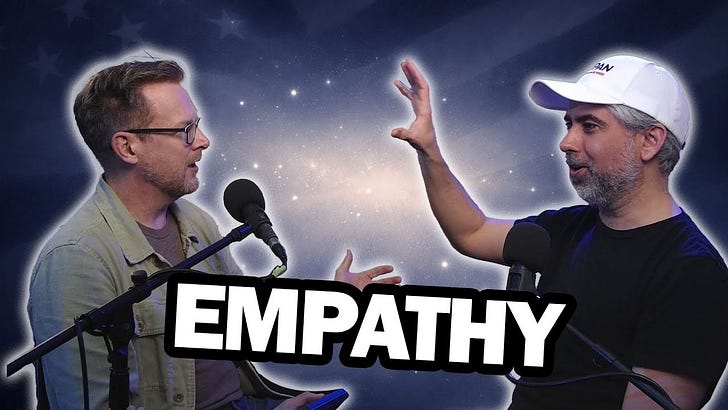
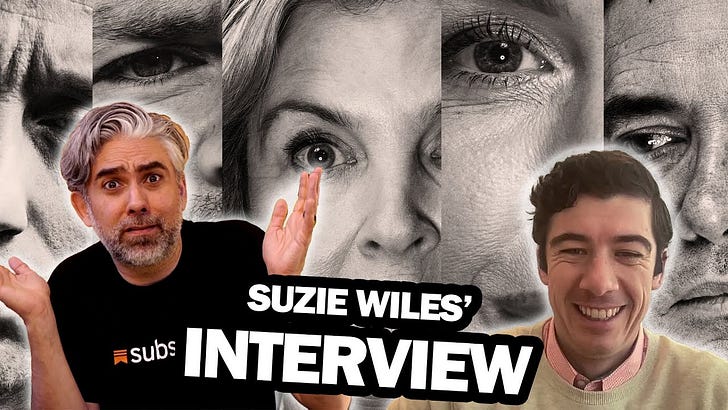
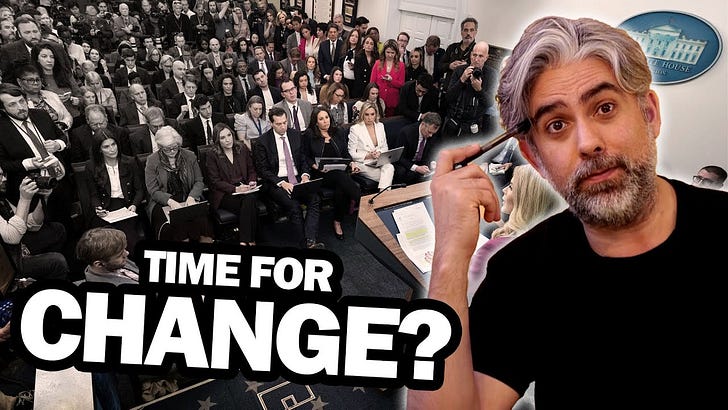
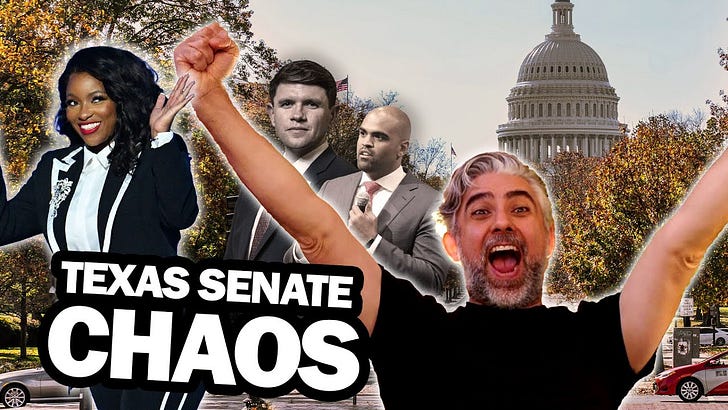
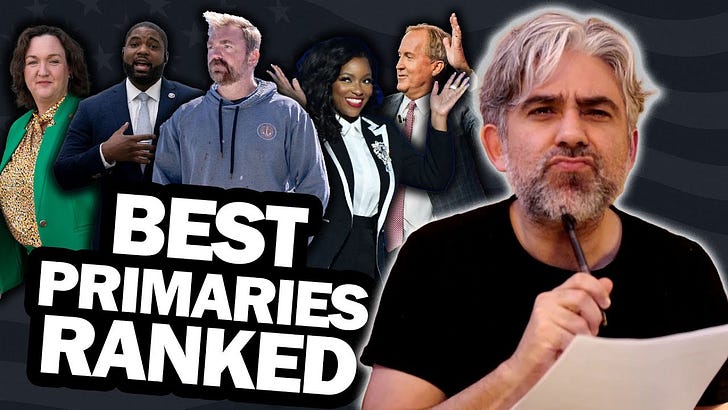
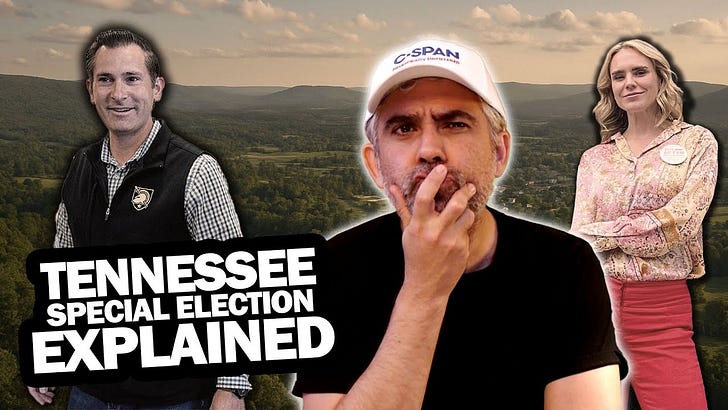
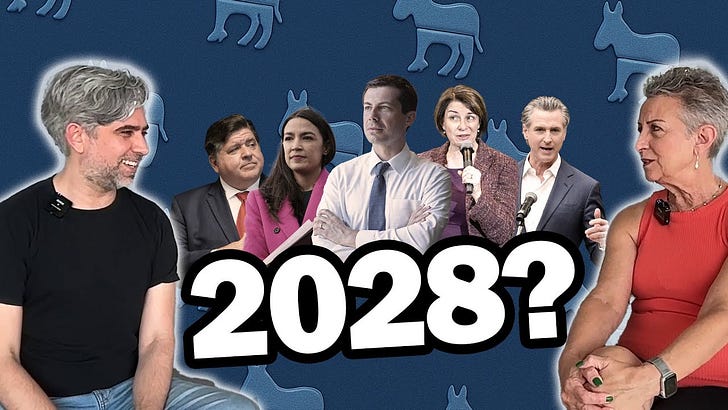
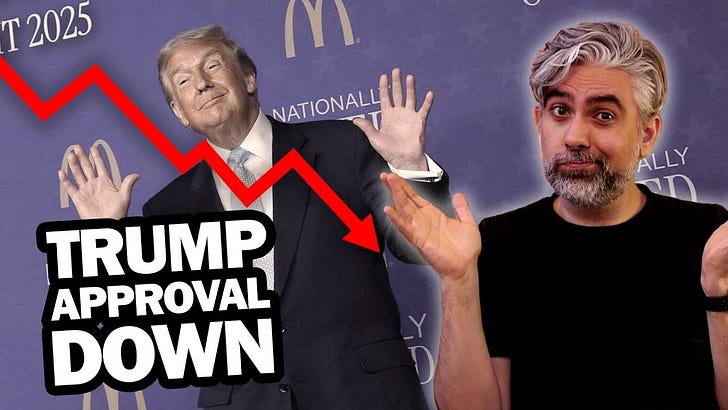
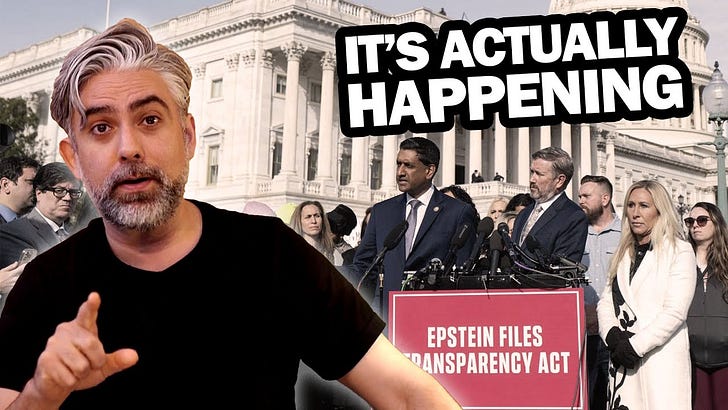
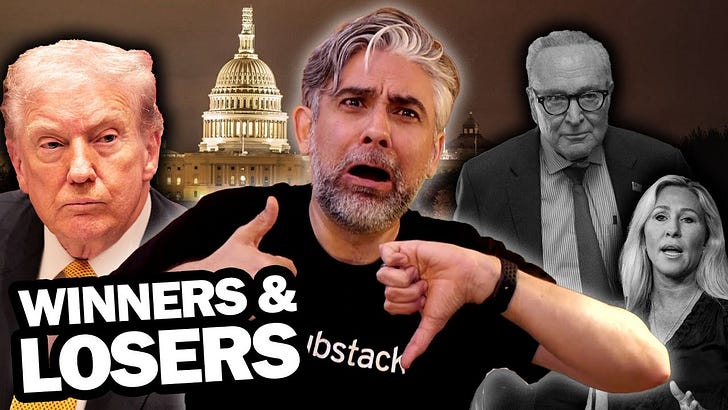
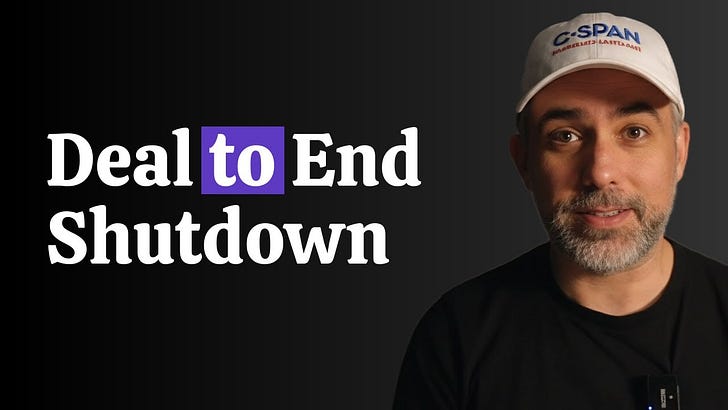
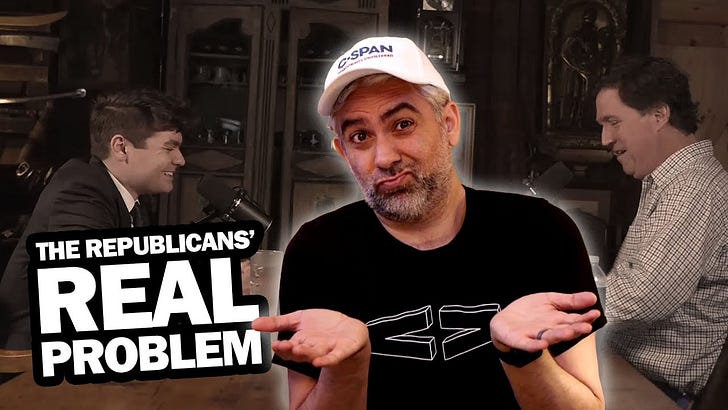
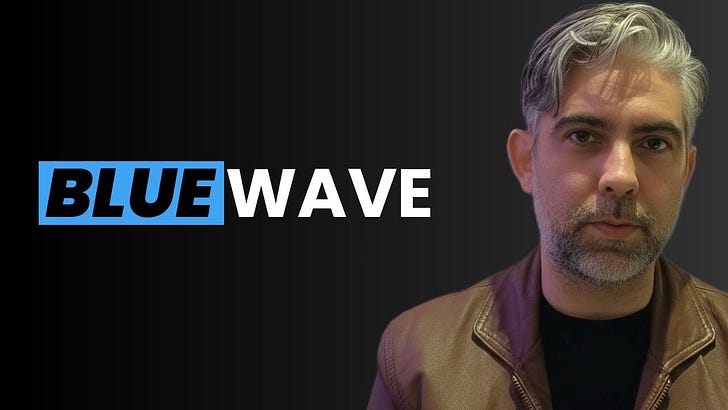
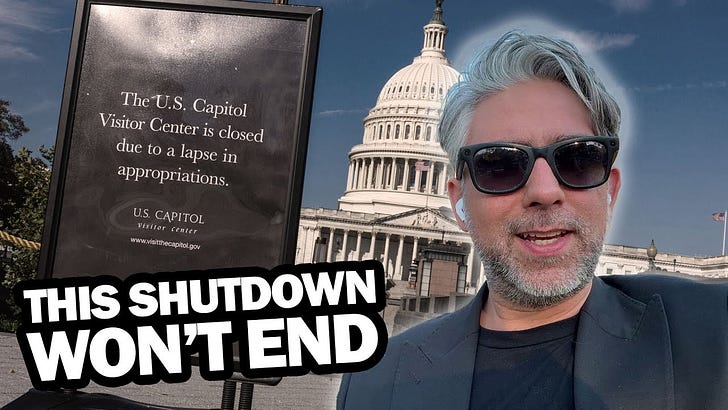
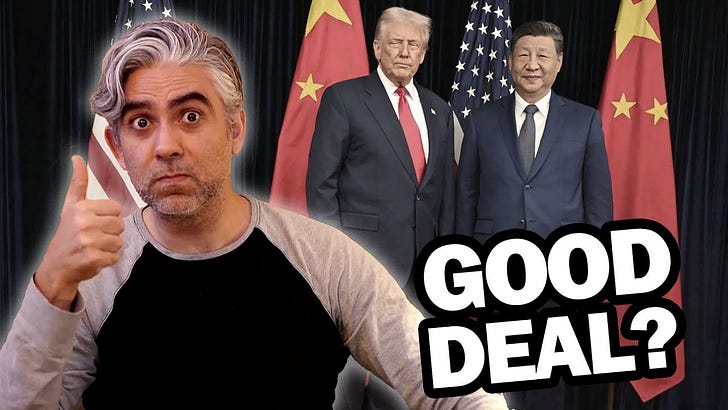
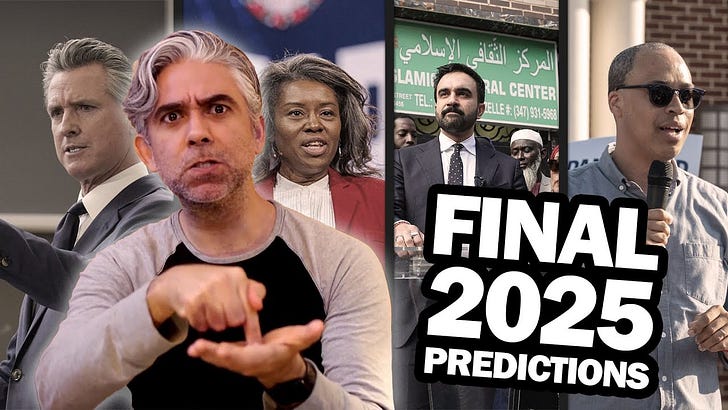
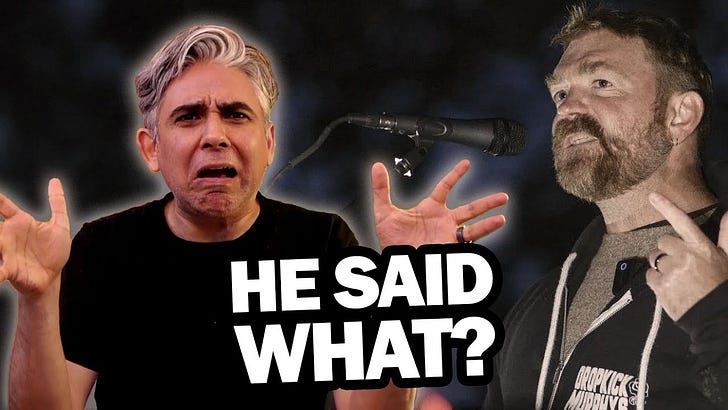

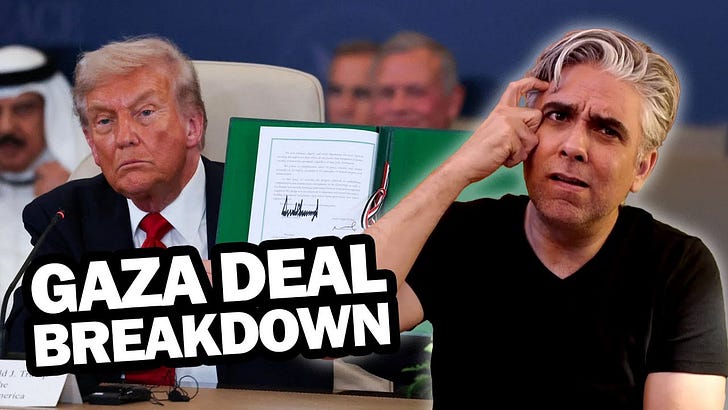



This my favorite political podcast.